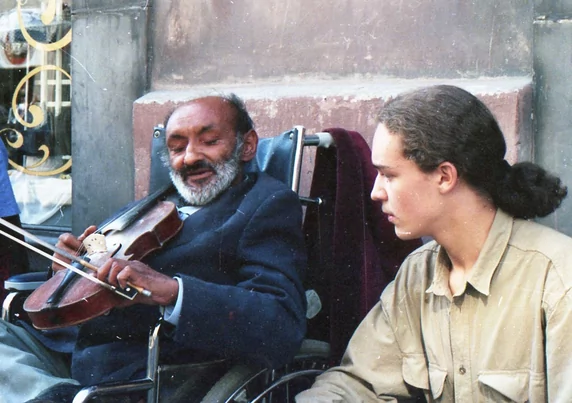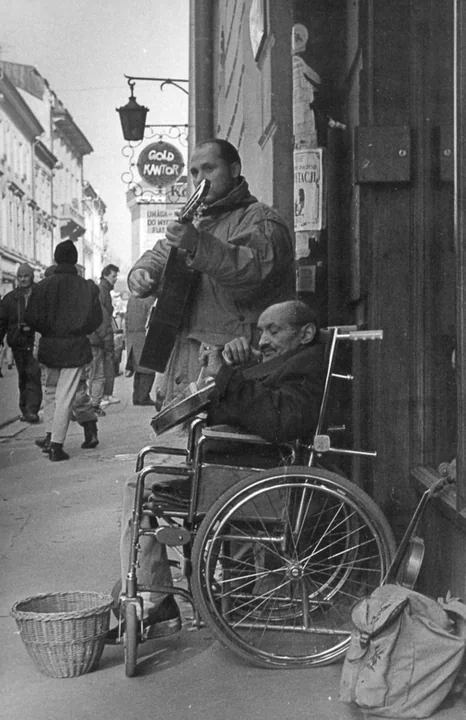|
|
Post by Bonobo on Oct 29, 2011 21:01:42 GMT 1
|
|
|
|
Post by Bonobo on Nov 5, 2020 15:03:19 GMT 1
|
|
|
|
Post by Bonobo on Jan 25, 2022 13:01:53 GMT 1
Stefan Dymiter, nicknamed Cororo (born May 5, 1938 in Płonna, died on October 26, 2002 in Krakow), a virtuoso gypsy violinist, self-taught.
As a child, Dymiter lost his sight and his legs were amputated. One of the most famous Polish street musicians. He collaborated with Piwnica pod Baranami. Honoring his talent was an invitation to a concert at the Krakow Philharmonic, where he delighted critics with his work. The musician was buried in Kowary.
There is the ethno music festival "CORORO - Ethno Stefan Dymiter Festival", which has been held in Kowary since 2012.www.onet.pl/styl-zycia/oludziach/o-niewidomym-skrzypku-ktory-fascynowal-przechodniow-i-znawcow-muzyki/5ew4qvk,30bc1058 
About a blind violinist who fascinated passers-by and music connoisseurs
Stefan Dymiter, played the violin at Floriańska Street in Krakow. An elderly, blind violinist in a wheelchair fascinated passers-by and music connoisseurs. Apparently, Yehudi Menuhin himself heard him and offered him a joint performance, and the artist Michał Misztal cultivates the memory of Kororo.
Katarzyna Kamińska
620
Yesterday, 14:36
Photo Michał Misztal, from the author's archive / Private archive
Kororo?
The nickname "Kororo" comes from the Upland Roma dialect, also known as the Carpathian dialect in the scientific language of Bergitka Roma. "Koro" means "blind" and "kororo" is a diminutive that translates as "blind", "blind".
You listened to him in the streets, right?
I have always been interested in the Roma: music, history and the Romani language. The first Roma I became acquainted with was the violinist Stefan Dymiter and the band "Romano drom". It was 1992, when I attended the State Secondary School of Arts in Krakow. From then on, I spent every free moment on Floriańska Street: I listened, recorded the brilliant violinist on the dictaphone, supplied him with strings and bows, and even switched to a violin with him! Although I do not play this instrument myself, the violin was in my home (I play the guitar a bit).
ADVERTISEMENT
ADVERTISEMENT
Did you get to know each other better or only on the street? What were you talking about, what was he saying about himself?
Those were wonderful times, I have often visited the apartment where Stefan Dymiter spent the last years of his life in Krakow. Meetings, feasts, the opportunity to learn about the Roma culture, talk with Stefan, and even try to make music together - I remember this time as something unique in my life, something that I have experienced a lot. I learned a lot about his personal life, a disease that accompanied him throughout his life. It is worth noting that Stefan mentioned that he was born blind and that the amputation of his leg sentenced him to the care of others. He never felt sorry for his handicap, he was a cheerful and witty man. Today, the topic of Korory returns, I work with people who are "haunted" by the topic of the genius violinist, we want to learn more. I know that Dymiter's biography is currently being created (book form), I also support documentary and radio drama projects. What will come of this? We'll see.
What fascinated you the most about him? Acceptance of fate, talent, defenselessness? He had to be out of this world? Today, and probably for a long time ... the real Gypsies are gone ...
A difficult question, I do not find one feature that would fascinate me in any particular way in this man, everything seemed to be incompatible with each other: the mutilated body, the "melodiousness" of the violin, which, if held in such an unnatural position, should theoretically not produce such subtle sounds. And the instrument itself? Cracked, dried out by the sun, stained with cigarette ash and rosin, washed with rain, it all increased the surprise of those walking down Floriańska Street. And I assure you, today you can still meet "real Gypsies" - people who have the ability to conjure music out of nothing, all you need is a clay jug or a wooden bowl and then you can hear dynamic, rhythmic music that makes you dance.
What was he playing? Apparently he held the violin in a unique way?
Everything, from hits, through themes of classical music, to patriotic melodies, czardasze. A self-taught gypsy musician held the instrument in a characteristic way: with his right hand on the fingerboard, resting the violin on his stomach, and a bow in his left hand. It was a unique way of using this instrument on a global scale, reminiscent of Indian musicians who hold string instruments in a similar position.
In one of your interviews you mentioned that he was always surrounded by someone from the Romanesque escort. It's a stupid question, but… they were using him, in the sense of taking his money? Did they care for him?
His Romani escort, if necessary, transported him from place to place. All the time someone was watching over him, taking care of him, smearing the bow with rosin, handing out a cigarette. Dymiter was the center around which everything happened. But it is known that his guardians often used donations that were left by passers-by.
Did they appreciate him? What do we know about him?
Little is known about Stefan Dymiter to this day. Apparently, Stefan was born in Płonna, poviat Sanok in the Podkarpackie Province, in 1938. Later, the fate of many Roma families depended on the difficult historical reality. Along with the Lemko people, many of them left for the territory of today's Ukraine. But the real tragedy was the famous "Akacja Wisła", when the remaining inhabitants were deported to northern Poland. Stefan's family followed in the footsteps of others looking for a place to live in the so-called Recovered Territories. One such curiosity is that I once met in Krakow a person from Korory's family who claimed that Stefan was born in Słupsk. This is further evidence of how little is really known about Dimitri. In 1960, according to documents, the family settled in Kowary, a town in the Karkonosze poviat. Stefan emphasized that Kowary was his favorite place. He wanted to be buried there, and it happened.
In Kowary itself, Stefan Dymiter is still remembered. The festival of his name is held there.
Heard about this festival but never got to go there. My greatest regret is that I could not attend Stefan's funeral. He was someone special to me and I have never met such a man in my life. I think he liked me, not everyone he liked. There was a bond between us that is difficult for me to define today. Anyway, we felt good in each other's company.
It was also possible to unveil a mural with his image at a stop in Podkarpacie. The memory of the artist returns ... I think it's good, right?
For many years, there have been no initiatives to commemorate this figure. Now, indeed, the memory of the artist returns. The aforementioned mural is the best proof of this. It is a pity that Krakow has so far failed to implement the ideas of people who wanted to commemorate the violinist. It's sad. However, I hope that now, together with a group of my colleagues, also fascinated by Stefan, we will implement the plans and plans I mentioned earlier.
Will you reveal what you are doing apart from cultivating the memory of Mr. Stefan?
I have always been interested in ethnography in the broadest sense of the word. I was born in the city, but I spent my childhood in the countryside and hence my curiosity about folk culture. I collect almost every product of this art, from sculptures to literary texts, paintings, toys and music. I have also been associated with the Order of the Camaldolese Fathers in Bielany in Krakow for many years. I visit this place quite regularly, I got to know a few hermits staying there. I was fascinated by the atmosphere of this place. Each free time I devote to one more passion, which is the world of nature, native flora and fauna.
|
|